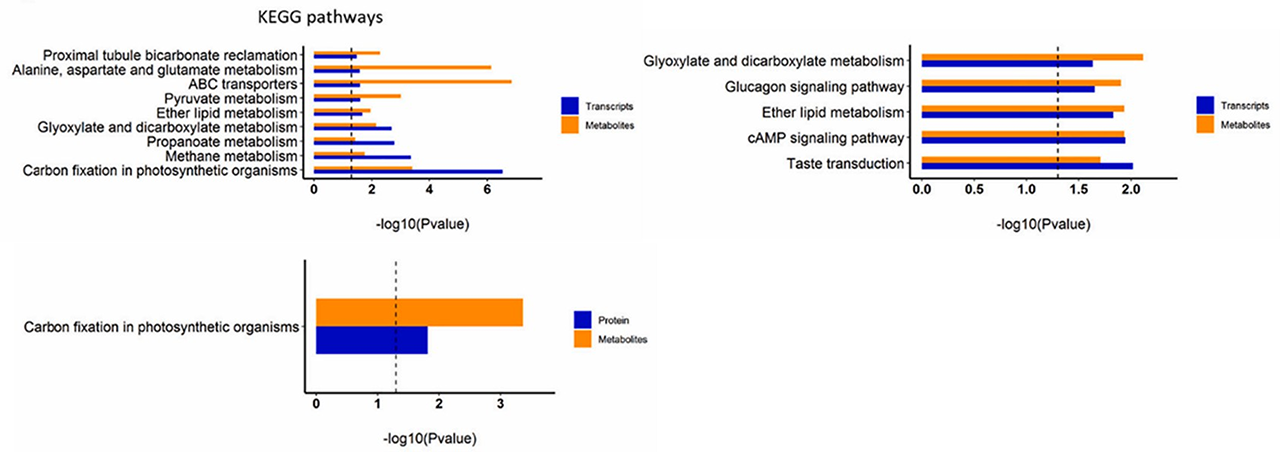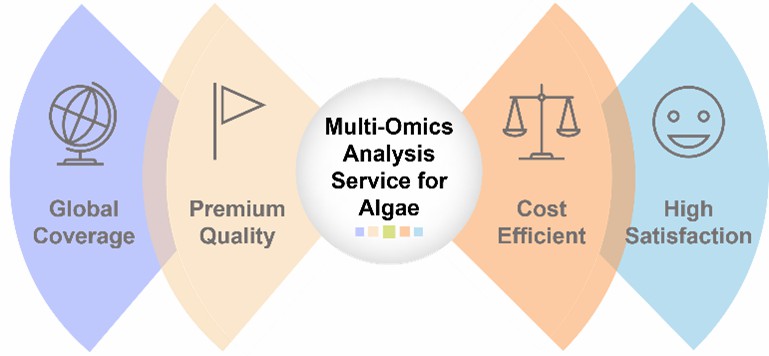Multi-Omics Analysis Service for Algae
Analysis of multi-omics and single-cell data using a systems biology approach allows optimal extraction of biological information encoded in various omics layers.
As a professional platform for algal research and analysis, Lifeasible has been working on algal omics for many years and can help customers understand the dynamic life secrets of algae.
Introduction to Multi-Omics
Multi-omics, also known as pan-omics, is a biological analysis method to study the relationship between genes, phenotype, and environment by systematically analyzing the genome, transcriptome, proteome, metabolome, and epigenome. The integration of complement omics data types is key to expanding our understanding of biological network wiring in targets or specific environments centered on specific developmental processes or environmental responses.
Multi-Omics Analysis of Algae
Studies targeting specific biological processes, as well as untargeted multi-omics approaches, have revealed novel gene functions in algal biology. Multi-omics studies on algae have focused on emergency responses to environmental stress and metabolic pathways of economically beneficial substances.
 Association Analysis Methods
Association Analysis Methods
Transcriptomic, proteomic and metabolomic data are analyzed by pairwise comparisons. When a protein is identified in the proteome and its genes are expressed at the transcriptome level, they are considered as related DEGs/DEPs (differentially expressed genes/differentially expressed proteins). The relationship between the number of proteins and genes involved is subsequently counted at quantifiable and significant levels.
In the association analysis of transcriptome (or proteome) and metabolome, the transcriptome (or proteome) of different groups is compared and analyzed based on the integration of data from the same KEGG (Kyoto Encyclopedia of Genes and Genomes) pathway to identify the DEGs (or DEPs) involved in an important metabolic pathway. Meanwhile, based on the results of the metabolome, changes in metabolites in that pathway are focused on to analyze the metabolite changes caused by gene (or protein) changes.
 Multi-Omics in Pyropia haitanensis
Multi-Omics in Pyropia haitanensis
A multi-omics study of the response of Pyropia haitanensis to a single stress of desiccation and a triple stress of desiccation, high temperature, and bright light show that conclusions based on a single omics dataset may not fully reflect the changes in the response of different biomolecules to stress. Through a comprehensive analysis of the genome, proteome, and metabolome, several related DEGs/DEPs, DEGs/DAMs (differentially accumulated metabolites), and DEPs/DAMs are found to be involved in the pathways glyoxylate and dicarboxylate metabolism, carbon fixation in photosynthetic organisms, and ether lipid metabolism.
 Fig.1 The multi-omics analysis of the common pathways during the response of Pyropia haitanensis blades to single stress and triple stresses, respectively. (Huang, L. B., et al., 2021, Algal Research)
Fig.1 The multi-omics analysis of the common pathways during the response of Pyropia haitanensis blades to single stress and triple stresses, respectively. (Huang, L. B., et al., 2021, Algal Research)
Our Services
The multi-omics analysis is beneficial to reveal the response mechanism of algae to environmental changes and to gain insight into the mechanism of biological metabolism. It also facilitates the study of new gene functions for practical applications in algae.
Lifeasible is able to provide high-quality and professional multi-omics analysis services for algae with our professional research platforms in genomics, epigenomics, transcriptomics, proteomics, and metabolomics.
Project Workflow

Why Choose Us

With a professional technology platform and experienced team, Lifeasible has been focusing on omics analysis and statistical analysis for algae for many years and have the capability to provide professional multi-omics analysis services for algae for clients worldwide. Please contact us for more information.
Reference
- Huang, L. B., Peng, L. N., & Yan, X. H. (2021). Multi-omics responses of red algae Pyropia haitanensis to intertidal desiccation during low tides. Algal Research, 58, 102376.
Our services are for research use only and not for any clinical use.